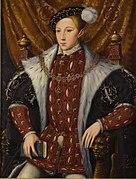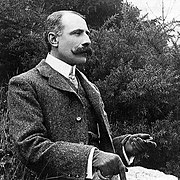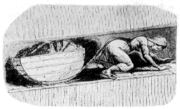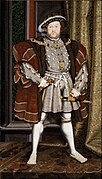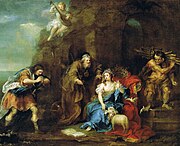Portal:England

| |
England is a country that is part of the United Kingdom. It is located on the island of Great Britain, of which it covers approximately 62%, and over 100 smaller adjacent islands. It has land borders with Scotland to the north and Wales to the west, and is otherwise surrounded by the North Sea to the east, the English Channel to the south, the Celtic Sea to the south-west, and the Irish Sea to the west. Continental Europe lies to the south-east, and Ireland to the west. At the 2021 census, the population was 56,490,048. London is both the largest city and the capital.
The area now called England was first inhabited by modern humans during the Upper Paleolithic. It takes its name from the Angles, a Germanic tribe who settled during the 5th and 6th centuries. England became a unified state in the 10th century and has had a significant cultural and legal impact on the wider world since the Age of Discovery, which began during the 15th century. The Kingdom of England, which included Wales after 1535, ceased to be a separate sovereign state on 1 May 1707, when the Acts of Union brought into effect a political union with the Kingdom of Scotland that created the Kingdom of Great Britain.
England is the origin of the English language, the English legal system (which served as the basis for the common law systems of many other countries), association football, and the Anglican branch of Christianity; its parliamentary system of government has been widely adopted by other nations. The Industrial Revolution began in 18th-century England, transforming its society into the world's first industrialised nation. England is home to the two oldest universities in the English-speaking world: the University of Oxford, founded in 1096, and the University of Cambridge, founded in 1209. Both universities are ranked among the most prestigious in the world.
England's terrain chiefly consists of low hills and plains, especially in the centre and south. Upland and mountainous terrain is mostly found in the north and west, including Dartmoor, the Lake District, the Pennines, and the Shropshire Hills. The country's capital is London, the metropolitan area of which has a population of 14.2 million as of 2021, representing the United Kingdom's largest metropolitan area. England's population of 56.3 million comprises 84% of the population of the United Kingdom, largely concentrated around London, the South East, and conurbations in the Midlands, the North West, the North East, and Yorkshire, which each developed as major industrial regions during the 19th century. (Full article...)
Edward VI (12 October 1537 – 6 July 1553) was King of England and Ireland from 28 January 1547 until his death in 1553. He was crowned on 20 February 1547 at the age of nine. The only surviving son of Henry VIII by his third wife, Jane Seymour, Edward was the first English monarch to be raised as a Protestant. During his reign, the realm was governed by a regency council because Edward never reached maturity. The council was first led by his uncle Edward Seymour, Duke of Somerset (1547–1549), and then by John Dudley, Duke of Northumberland (1550–1553).
Edward's reign was marked by many economic problems and social unrest that in 1549 erupted into riot and rebellion. An expensive war with Scotland, at first successful, ended with military withdrawal from Scotland and Boulogne-sur-Mer in exchange for peace. The transformation of the Church of England into a recognisably Protestant body also occurred under Edward, who took great interest in religious matters. His father, Henry VIII, had severed the link between the English Church and Rome but continued to uphold most Catholic doctrine and ceremony. It was during Edward's reign that Protestantism was established for the first time in England with reforms that included the abolition of clerical celibacy and the Mass, and the imposition of compulsory English in church services. (Full article...)

Cornwall (/ˈkɔːrnwɔːl, -wəl/; Cornish: Kernow; Cornish pronunciation: [ˈkɛrnɔʊ]; or [ˈkɛrnɔ]) is a ceremonial county in South West England. It is recognised by Cornish and Celtic political groups as one of the Celtic nations, and is the homeland of the Cornish people. The county is bordered by the Atlantic Ocean to the north and west, Devon to the east, and the English Channel to the south. The largest urban area in the county is a conurbation that includes the former mining towns of Redruth and Camborne, and the county town is the city of Truro.
The county is rural, with an area of 1,375 square miles (3,562 km2) and population of 568,210. Outside of the Redruth-Camborne conurbation the largest settlements are Falmouth, Penzance, Newquay, St Austell, and Truro. For local government purposes most of Cornwall is a unitary authority area, with the Isles of Scilly having a unique local authority. The Cornish nationalist movement disputes the constitutional status of Cornwall and seeks greater autonomy within the United Kingdom. (Full article...)

English cuisine encompasses the cooking styles, traditions and recipes associated with England. It has distinctive attributes of its own, but is also very similar to wider British cuisine, partly historically and partly due to the import of ingredients and ideas from the Americas, China, and India during the time of the British Empire and as a result of post-war immigration.
Some traditional meals, such as bread and cheese, roasted and stewed meats, meat and game pies, boiled vegetables and broths, and freshwater and saltwater fish have ancient origins. The 14th-century English cookbook, the Forme of Cury, contains recipes for these, and dates from the royal court of Richard II. (Full article...)

- ...that the Mendip Hills (commonly called The Mendips) are a range of limestone hills situated to the south of Bristol and Bath in Somerset?
- ...the England and Wales Cricket Board was created on 1 January 1997 combining the roles of the Test and County Cricket Board (TCCB), the National Cricket Association (NCA) and the Cricket Council?
- ...that the Flag of England is the St George's Cross?
- ...that the Tudor rose (pictured) is a traditional heraldic emblem of England and takes its name and origins from the Tudor dynasty?

- 24 October 2024 – Regulation of electronic cigarettes, Smoking bans in the United Kingdom
- The British government announces that single-use vapes will be banned in England and Wales beginning on 1 June 2025. (BBC News)
- 23 October 2024 –
- Three people are found deceased and seven are hospitalized due to carbon monoxide poisoning at a care home in Swanage, Dorset, England. (Sky News)
- 16 October 2024 –
- An explosion at a house in Newcastle upon Tyne, England, kills at least two people and injures six others. An investigation to determine the cause of the explosion by the Health and Safety Executive is underway. (BBC News)
- 15 October 2024 –
- A car driving in the wrong direction collides with another car on the M6 motorway in Cumbria, England, killing five people, including two children and seriously injuring another. (BBC News) (Sky News)
| “ | An Englishman, even if he is alone, forms an orderly queue of one. | ” |
England • Bedfordshire • Brighton • Cheshire • Cornwall • Derbyshire • Dorset • Greater Manchester • Hampshire • Lincolnshire • London • Merseyside • Northamptonshire • North East England • Sheffield • Surrey. Warwickshire • West Midlands • Worcestershire • Yorkshire

- Please visit the English Wikipedians' notice board and help to write new England-related articles, and expand and improve existing ones.
- Visit Wikipedia:WikiProject England/Assessment, and help out by assessing unrated English articles.
- Add the Project Banner to English articles around Wikipedia.
- Check for announcements and open tasks for ways to improve English related articles.
- Help nominate and select new content for the England portal.
- Requested articles: Charterhouse Lane • Renewable energy in England • Ealing Village
- Expand: Dorothy Boyd • David Troughton
 |
 |
 |
 |
 |
 |
 |
 |
| East Midlands | London | North East | North West | South East | South West | West Midlands | Yorkshire and the Humber |

|

|

|

|

|
| Ireland | Northern Ireland | Scotland | United Kingdom | Wales |
The following Wikimedia Foundation sister projects provide more on this subject:
-
Commons
Free media repository -
Wikibooks
Free textbooks and manuals -
Wikidata
Free knowledge base -
Wikinews
Free-content news -
Wikiquote
Collection of quotations -
Wikisource
Free-content library -
Wikiversity
Free learning tools -
Wikivoyage
Free travel guide -
Wiktionary
Dictionary and thesaurus















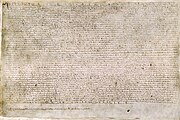










![Image 24The Staffordshire Hoard is the largest hoard of Anglo-Saxon gold and silver metalwork yet found[update]. It consists of almost 4,600 items and metal fragments. (from Culture of England)](http://upload.wikimedia.org/wikipedia/commons/thumb/6/60/Staffordshire_hoard_annotated.jpg/180px-Staffordshire_hoard_annotated.jpg)





















